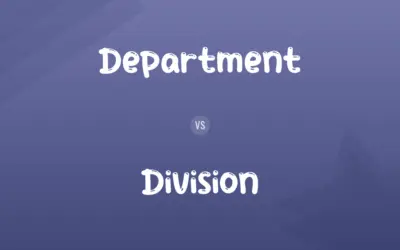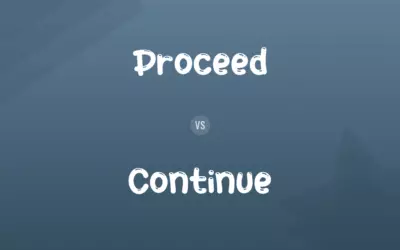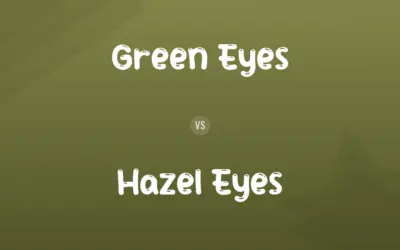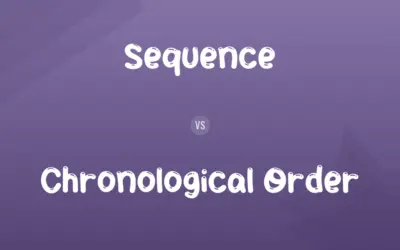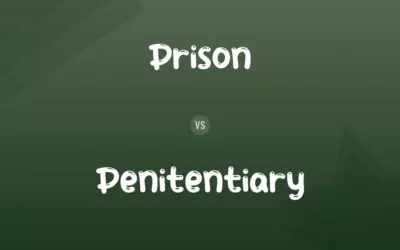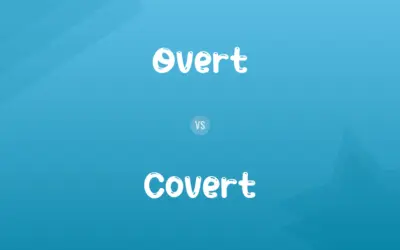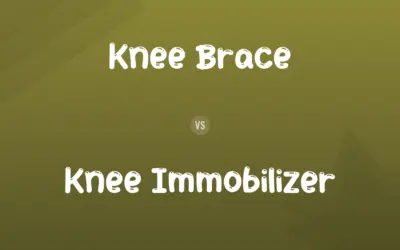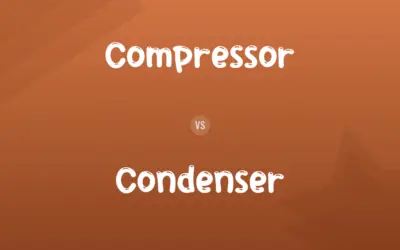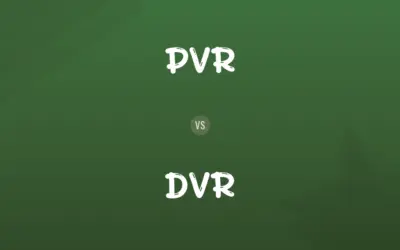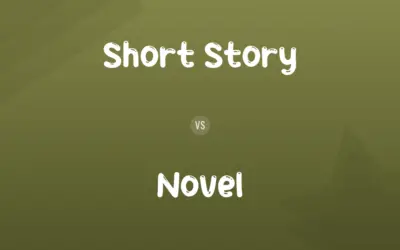Complicitly vs. Complicit: Difference and Comparison
Edited by Muazma Batool — By Muneeza Rehman — Updated on September 26, 2023
"Complicitly" is an adverb describing the manner of involvement in wrongdoing, while "complicit" is an adjective indicating direct involvement in or knowledge of a wrongdoing.
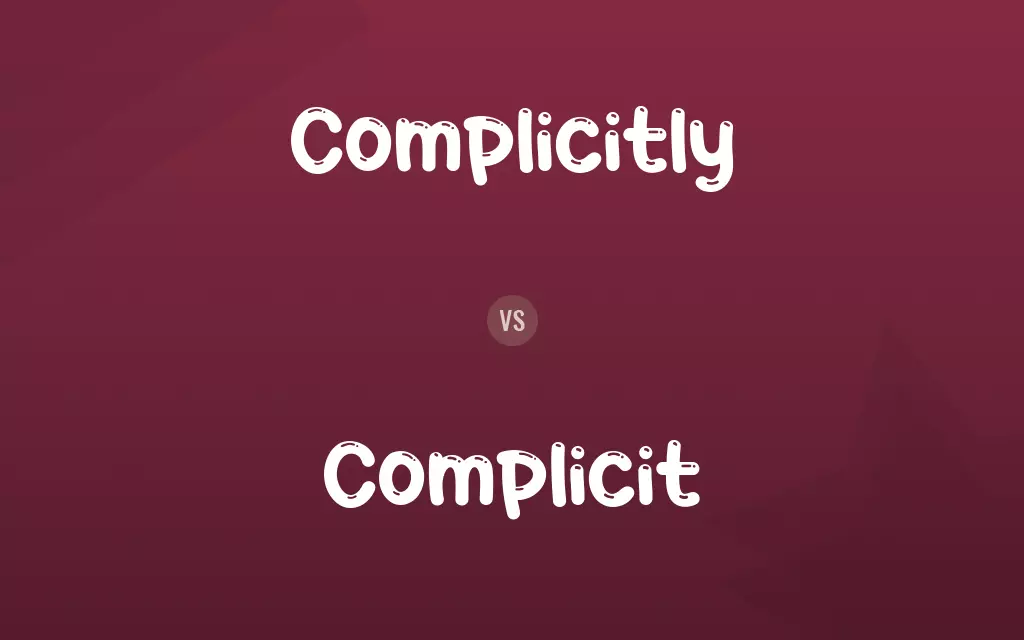
Difference Between Complicitly and Complicit
"Complicitly" is the adverbial form of "complicit." It describes the manner in which someone might be involved in or assist with a wrongdoing. When someone acts complicitly, they are taking actions or exhibiting behavior that demonstrates their participation. On the other hand, "complicit" is an adjective. It is used to directly describe someone or something that has involvement in or knowledge of a wrongdoing.
Muneeza Rehman
Sep 26, 2023
The distinction between the two words is mainly their roles in a sentence. "Complicitly" often modifies verbs, explaining how an action was carried out in the context of being involved in a misdeed. For example, one might say, "She complicitly ignored the rules." "Complicit," meanwhile, is used to describe nouns. For instance, saying "He was complicit in the scandal" highlights the person's involvement.
Muazma Batool
Sep 26, 2023
Grammatically, the difference between "complicitly" and "complicit" is akin to the distinction between other adverbs and adjectives, like "quickly" (adverb) and "quick" (adjective). "Complicitly" provides detail on how an action is executed with awareness or involvement in wrongdoing, while "complicit" is a descriptor for entities that are knowingly involved.
Muneeza Rehman
Sep 26, 2023
Understanding when to use each word is crucial for clarity in communication. Using "complicitly" emphasizes the manner of an action in relation to a wrongdoing, and employing "complicit" underscores the direct involvement or knowledge of an entity in a particular misdeed.
Levi
Sep 26, 2023
Lastly, it's key to remember that both words have a negative connotation. They imply knowledge of and involvement in activities that are unethical, illegal, or otherwise deemed wrong by societal standards.
Lucas
Sep 26, 2023
Complicitly vs. Complicit Comparison Chart
Description
Describes how an action is done in a wrongful manner
Indicates direct involvement in wrongdoing
Muazma Batool
Sep 26, 2023
Connotation
Negative, implying manner of involvement in wrongdoing
Negative, implying direct involvement in wrongdoing
Muneeza Rehman
Sep 26, 2023
Typical Sentence Structure
Used before or after a verb
Used before a noun or as a predicate adjective
Henry
Sep 26, 2023
Complicitly vs. Complicit Definitions
◉Complicitly
Through actions that demonstrate indirect participation in a misdeed.
They complicitly turned a blind eye.
William
Sep 26, 2023
◉Complicit
Having knowledge of and participation in a misdeed.
He was complicit in the cover-up.
Leo
Sep 26, 2023
◉Complicitly
By behaving in a way that supports or condones an offense.
She complicitly continued the deceptive practice.
Jonathan
Sep 26, 2023
◉Complicit
Involved with others in an illegal activity or wrongdoing.
They were complicit in the theft.
Muazma Batool
Sep 26, 2023
◉Complicitly
Through indirect assistance in an illicit activity.
They complicitly enabled the crime to happen.
Muneeza Rehman
Sep 26, 2023
◉Complicitly
In a manner showing involvement in wrongdoing.
He complicitly accepted the bribe.
Muazma Batool
Sep 26, 2023
◉Complicit
Collaborating or cooperating in a wrongdoing.
The entire group was complicit in the plot.
Lucas
Sep 26, 2023
◉Complicitly
By knowingly aiding in an unethical act.
She complicitly kept the secret from authorities.
Muneeza Rehman
Sep 26, 2023
◉Complicit
Sharing responsibility for an unethical act.
The officials were complicit in the scandal.
Muneeza Rehman
Sep 26, 2023
◉Complicit
Associated with or participating in a questionable act or a crime; having complicity
"Presidential handlers and a complicit press corps managed to suppress public awareness" (Andrew P.N. Erdmann).
Muneeza Rehman
May 03, 2023
◉Complicit
Associated with or participating in an activity, especially one of a questionable nature.
Muneeza Rehman
May 03, 2023
Complicitly vs. Complicit Frequently Asked Questions
Does complicitly always imply a negative action?
Yes, complicitly usually denotes involvement in wrongdoing.
Muneeza Rehman
Sep 26, 2023
Is complicit used to describe direct or indirect involvement?
Complicit often suggests direct involvement or knowledge of a misdeed.
Muazma Batool
Sep 26, 2023
Do complicitly and complicit come from the same root?
Yes, both derive from the term "complicity," referring to partnership in wrongdoing.
Muneeza Rehman
Sep 26, 2023
Would "complicitly" always follow a verb?
Not always; while it often follows, it can also precede the verb it modifies.
Elijah
Sep 26, 2023
Is there a noun form of complicit?
The noun form related to complicit is "complicity," indicating involvement in wrongdoing.
Leo
Sep 26, 2023
Is complicit a strong term?
Yes, complicit is a strong term implying awareness and involvement in something unethical or illegal.
Muneeza Rehman
Sep 26, 2023
Would saying someone is complicit always imply guilt?
While complicit suggests involvement, it doesn't always denote legal guilt, but often ethical responsibility.
Henry
Sep 26, 2023
Is it correct to say "He acted complicit"?
No, the correct form would be "He acted complicitly" or "He was complicit."
Kaitlyn
Sep 26, 2023
Can complicitly modify any verb?
Complicitly can modify verbs that relate to actions tied to wrongdoings or unethical behavior.
Muneeza Rehman
Sep 26, 2023
How would you use complicit in a passive sentence?
An example might be, "The crime was committed, and several individuals were found to be complicit."
Leo
Sep 26, 2023
Content Creators
Written by
Muneeza RehmanAt Comparisons.wiki, Muneeza skillfully navigates the vast sea of information, ensuring clarity and accuracy as the lead content editor. With a keen eye for detail, she curates every comparison to enlighten and engage readers.
Edited by
Muazma BatoolAs a content editor, Muazma Batool is not just a grammar guru but a creative mastermind who breathes life into every word. With an eagle eye for detail and a passion for storytelling, she transforms bland text into engaging content that captivates audiences and drives results.





